United States Society 7
Los Angeles and the prelude to a Summit

Los Angeles and the prelude to a Summit (+ Video)
Some Miami-based anti-Cuba hate-mongers, especially in the South Florida media, have begun to appear, announcing their attendance to the Summit.
Translated and edited by Walter Lippmann for CubaNews.
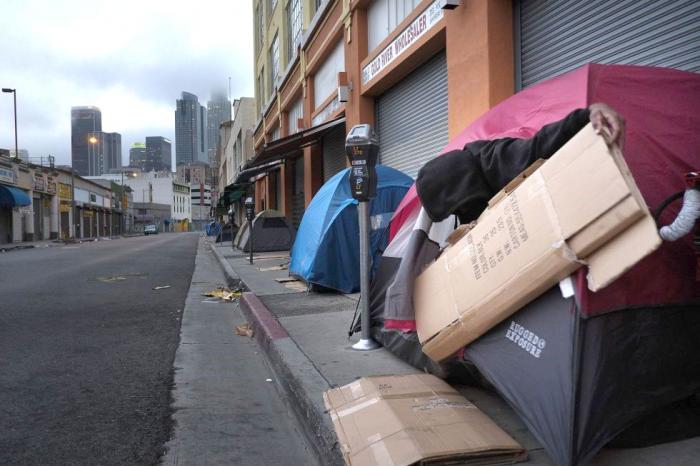
In Los Angeles, three out of four homeless people have no bed in any shelter or temporary solution. PHOTO: AP
Prelude to the Summit of the Americas in Los Angeles, United States, at the end of the first weekend of June, the meeting continues to suffer from a “strange” silence on the part of its hosts and, except for a last-minute invitation to the President of the Spanish government to attend as Joe Biden’s guest -is it that Spain is in America?-, little is known about the subject.
The invitation from across the seas is focused on the issue of migrants. I am not very convinced that Biden’s power of persuasion can involve a country in this issue that continues to lead the European Union in unemployment, with a rate of 13.3%.
The U.S. administration hopes that Spain will agree to double or triple the number of temporary workers from Central America, according to Axios.
Regarding the participation of the President of Mexico, Andrés Manuel López Obrador [AMLO], it was reported that the U.S. President wishes his Mexican counterpart to accompany him in person at the meeting.
López Obrador has stated that, if Washington does not invite all the countries of the Americas to the Summit, he would not cancel his nation’s participation in the event, but would send his representative, the Minister of Foreign Affairs.
Also in the last few days, especially in the South Florida press, some Miami-based anti-Cuba hate-mongers have begun to appear, announcing their attendance at the Summit. The publications do not explain whether they are part of the so-called civil society, knowing that they are counter-revolutionaries of Cuban origin.
The rest of this poorly made movie has been put in the hands of the media related to its organizers so that they can “make a fuss” about the ups and downs and manipulations of the hosts, which are not at all transparent.
For the Spanish newspaper El País, the city is “the misery capital of the United States”, and argues that the number of “homeless” people there has increased by 23% in one year, and details that three out of four homeless people do not have a bed in any shelter or temporary solution.
Across the United States, there are 553,000 people sleeping on the streets.
According to the RT website, the “hidden face” of Los Angeles is its poverty rate. It is estimated that there are about 66,433 homeless people in the city, and the African-American population continues to be the hardest hit by this scourge, if one compares the proportion of 33.7% with the total population, since this community only represents 7.9% [of the whole].
ATTACK AGAINST THE PEOPLE`S FORUM REJECTED
The attacks against the headquarters of The People’s Forum, in New York City, have been rejected by institutions and social movements that warn of the action of right-wing groups in the United States, with the support of the police.
“From Casa de las Americas we send all our support and solidarity to the members of The People’s Forum (TPF), whose headquarters in New York City has been the object of an illegal attack by reactionary forces of the extreme right”, a communiqué from this institution states.
According to Prensa Latina reports, more than a dozen New York Police Department agents entered TPF without being invited and acted as security for the extreme right-wing, which carried out the illegal attack.
The Cuban Institute of Friendship with the Peoples (ICAP) expressed its strong rejection of the aggression against the organization.
It is noteworthy that this attack takes place when many TPF staff and leadership members are in Los Angeles organizing the People’s Summit for Democracy, ICAP stressed.
Cuba: zero tolerance for drug trafficking

Cuba: zero tolerance for global drug trafficking threat
Permanent vigilance and timely response by specialized forces made it possible to dismantle a criminal network organized by Cubans from Mexico.
Translated and edited by Walter Lippmann for CubaNews.
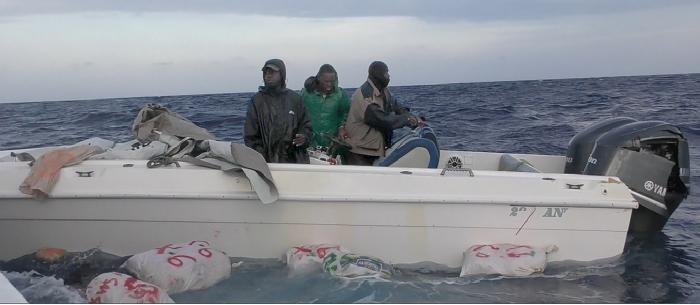
While the world is plunged into the devastating pandemic of COVID-19, hundreds of new and increasingly dangerous synthetic drugs are invading every corner of the planet, adding to the abuse of marijuana, cocaine and heroin, which affect almost 300 million people.
The main market on the planet, the United States, has the highest number of deaths from drug overdoses in its history, with more than 100,000 deaths between April 2020 and the same month in 2021, most of them due to the so-called opioid epidemic, which increased lethality by 28.5%.
Illicit drug trafficking and consumption continue to be a serious global phenomenon that threatens international security and from which no country can escape, due to the complex and sophisticated networks of the lucrative drug trafficking business (more than $600 billion in annual profits), the omnipresence of the mafias, the use of maritime and air corridors, ways of operating and inserting themselves into the dynamics of world trade, and allying with other forms of international organized crime.
The effects of international trafficking continued to impact Cuba in 2021, from the complex regional framework, its incidence in the Caribbean, the existence of routes close to our territory and the arrival of packages dragged by sea currents (recalos), which represented the largest volume of seized drugs and a potential danger for the articulation of internal trafficking. Attempts to smuggle or introduce drugs across maritime and air borders were also confronted; marijuana crops were dismantled and internal trafficking activities were neutralized.
The persistence and intentionality of Cuban and foreign emigrants to organize drug operations with the support of Cuban citizens was noted, for which they rearranged and diversified their actions, using unaccompanied loads, postal shipments and the use of speedboats.
One of the most dangerous trends of the year was the combination of human trafficking operations with attempts to smuggle drugs into the country using speedboats and other vessels, in line with the changes generated by international crime.
Likewise, 18 sightings of suspicious means that violated the airspace and eight vessels in alleged illicit operations were detected, all of which evidences an increase in the threats in the maritime and air environment of the Cuban archipelago.
These challenges demanded a redoubling of surveillance, persecution and coordinated confrontation between the bodies of the Ministry of the Interior (Minint), the General Customs of the Republic, other participating agencies and the people.
A YEAR OF INTENSE CONFRONTATION
According to information provided by MININT, as a result of the confrontation in 2021, Cuba seized a total of 4 162.23 kilograms (kg) of drugs, mostly marijuana; captured five naval means involved in drug trafficking operations and confiscated goods and sums of money due to these illicit activities.
The largest amount of drugs – it was revealed – was seized in the 295 drug seizures, higher than the 153 in 2020, and with a total of 2,338.64 kg of drugs seized in those events. Other high volumes were captured during the seizure of the aforementioned vessels.
As for the air border, 21 international drug trafficking operations were neutralized at the José Martí International Airport in the capital, in which 67.59 kg of these substances were seized and 41 people, including foreigners and nationals, were arrested.
In the fight against the cultivation of marijuana, 97 plantations were discovered, in which 32,868 plants and 48,521 seeds were seized. Meanwhile, 121 acts of internal trafficking were neutralized, with 165.63 kg of marijuana.
CHECKMATE AT SEA
The permanent surveillance and timely response of the specialized forces made it possible to dismantle a criminal network organized by Cubans from Mexico, with a support base in Panama, Costa Rica and Cuba, with the intention of smuggling marijuana, cocaine and methamphetamines, using passengers, cargo and speedboats in combined human and drug trafficking operations. As a result of this operation, 26 individuals were arrested, 303.37 kg of drugs were seized, and a speedboat was captured.
In addition, two other vessels linked to combined human and drug trafficking operations directed to Cuba from Mexico, the U.S. and Jamaica were neutralized and seized, in which significant amounts of marijuana and synthetic cannabinoids were seized.
In addition, two other speedboats were captured with six Bahamian crew members on board, who were seized with 1,291.82 kg of marijuana, and who were linked to operations not directed to Cuba.
The results of 2021 confirm the political will of the Cuban government to continuously strengthen the fight against the serious global scourge of drug trafficking and the prevention of drug abuse, and to prevent the use of airspace and territorial sea by international drug traffickers, with their lethal cargo destined for the main consumer markets, or to try to penetrate the country.
Empty shelves in the U.S.?

Empty shelves in the U.S.?
The crisis caused by the pandemic is visible even in the country that sustains its abundance at the expense of the world.
Translated and edited by Walter Lippmann for CubaNews.

Empty shelves at a Trader Joe’s supermarket on Spring Street, New York. Photo: CNN
A news report, which seems unusual, is going around the world: CNN claims that there are shortages in supermarkets in the United States. It added that those who run the establishments do not see a solution in the short term, while “disgruntled” shoppers have given “vent to their frustration on social networks”.
Images of empty shelves at stores such as Trader Joe’s, Giant Foods and Publix astound those who still cannot believe the fact that there could be shortages in the land of consumerism.
According to CNN, the causes of the shortages are multiple. The two-year pandemic and the impact of the disease on the lack of personnel for functions such as transportation and logistics, which in turn affects the delivery of products and the restocking of stores.
The National Association of Grocery Stores indicates that many of its members have less than 50% of their workforce. Add to this a continuing shortage of truck drivers and record congestion at the ports.
$2.4 trillion was the value of U.S. imports in 2020, according to Statista. Demand for imported food products grew because it is cheaper to bring them in than to produce them. Consumption patterns that favor frozen and packaged products, which require a powerful industry for permanent supply, also play a role.
Due to the pandemic, import levels have decreased due to the impossibility of guaranteeing the transfer of goods from one country to another, and this affects the supply chain, to which is added the lack of suitable personnel to work, due to the increase of contagions within the country due to the circulation of the Omicron strain.
CNN reported that sick leave accounts for 60% of the total number of infections in the country, in addition to quarantine isolations and distancing protocols.
In addition to this situation, there are adverse weather conditions, with very low temperatures, as well as drought and fires that damaged crops such as wheat, corn, soybeans and coffee.
Today, in addition, the population is panicking about shortages and hoarding, which contributes to a further and rapid decrease in supply.
The increase in empty shelves and prices also poses a danger to Biden and the Democrats, as the Republican narrative exposes the ineffectiveness of the president, who promised, when he took office, to contain COVID-19 and economic dislocation for millions and millions of Americans. The crisis implied by the pandemic is visible even in the country that sustains its abundance at the expense of the world.
The three battles of 2021

The three battles of 2021
 By Agustín Lage Dávila
By Agustín Lage Dávila
December 28, 2021
Translated and edited by Walter Lippmann for CubaNews.
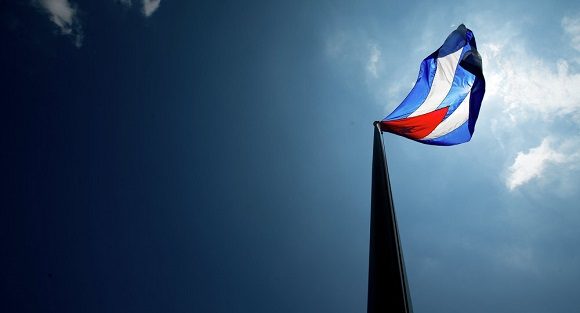
Photo: AP
This (No. 25) is the last note of 2021 and it is unavoidable to use it to summarize the message of what we appreciate has been essential in this difficult but also glorious year.
Cubans, each one from his or her position, with his or her ideas and values, but essentially all of us, have been involved in three great battles that will decide our future:
The control of the COVID epidemic.
The confrontation of the media and cultural aggression against our project of society.
Economic development, even in the context of the blockade.
These posed enormous threats to us: the first one threatened our health, the second one, our thinking, the third one, our material sustenance. The three together threatened our Nation.
In the first two we won, unquestionably. We must consolidate them and project them into the future, because they can continue, but they are essentially victories. In the third one, we managed to resist, which is no small thing, and it is the indispensable step to win, but the great victory still requires a lot of effort and intelligence.
The control of the epidemic of COVID-19 was achieved this year with biotechnology, science, the strength, and the experience and universality of our health system, and the educated participation of the people and their institutions. It validated the fertility of the scientific development strategy implemented by the Revolution for decades, and the importance of the connections between science and production that were built since the founding moments of the Scientific Pole, under Fidel’s leadership.
It validated the concept that health cannot be merchandise, and that the budgeted or entrepreneurial institutions on which health services depend have to be the socialist property of all the people. This is not only for moral reasons (which is the main thing) but also for reasons of efficiency. This battle will leave experiences for the improvement and development of both actors, industry and the health system, which we must apply immediately because the global pandemic context will continue in 2022.
The media and cultural aggression, with which, especially this year, an attempt was made to divide the people and erode their collective capacity to respond to the challenges of the moment, was defeated. Its implementation and financing (we know well by whom), in combination with the reinforcement of the blockade, precisely at a time when we were facing a dangerous epidemic, will go down in history as one of the greatest political immoralities of this century. It will be remembered in the gallery of shame, together with the Weyler reconcentration, the Nazi holocaust, the nuclear bombing, the Vietnam war, the support to the dictatorships of the South American cone, the South African apartheid and the murders of teachers by counterrevolutionary gangs in Cuba. History will not absolve its articulators.
The media and cultural aggression against Cuba is a war of thought. We defeated it, as Martí wanted “with thought”. The encouragement of violence, the promotion of selfish appetites, the distrust in the future of the country, and the dissemination of intellectual superficialities, crashed against the wall of Cuban culture, now solidified by six decades of massive and free access to education. They gambled on finding many influential fools in Cuba, and it turned out that there were very few.
This battle also leaves us experiences for the improvement and development of political and cultural work, which must be well analyzed because this episode of 2021 is part of an historical dispute of more than two centuries.
The third battle, that of economic development, has not yet been won. And it would be superficial to attempt a simplifying analysis in the space of 4 pages of a blog. But there are some things to say:
The first is that we have resisted the longest economic onslaught in world history (60 years), articulated by the largest economic and military power in world history; and we continue to resist 30 years after the collapse of the allies we had in Eastern Europe. And here we are, our people without hunger, without mafias, without housing evictions, with all their children in school, with our people’s government functioning under the socialist Constitution that we made and approved ourselves. This capacity dor resistance makes us proud, not only because of the resistance itself, but also because it indicates our capacity for development. Without sovereignty and national unity, no economic strategy, no matter how “technically brilliant” it might be, could work.
The second is that we are not frozen in old economic strategies, which worked at the time but have already fulfilled their historical role and exhausted their capacity to adapt to the changes in the world economy. We are in a moment of legislative and organizational creativity to adapt our development model to the new realities, without ceasing to be sovereign, equitable, educated and socialist.
The third is that the road to economic and social development must be traveled in a world context that is not the one that existed in the 1960s, when the Revolution made its first plans for economic take-off. We must now work in a globalized economy, which depends much more on the external economic balance, and on the capacity for international insertion, especially for small countries. It is also in an economy of rapidly changing technologies, which demands a higher dynamic of creation of diverse enterprises and connections between enterprises and scientific and educational institutions, as well as a higher dynamic of diversification of products and services of high added value.
All this requires managerial as well as technological creativity, and it is necessary to create the regulatory context that allows and stimulates it; and to train the young cadres who will play a leading role in it.
The fourth is that, with few natural resources and scarce domestic demand, and with a blockade that will continue (because our historical adversaries do not know how, nor can they do otherwise), our audacity to build material prosperity based on social justice and access to knowledge is essentially a cultural challenge. It will be culture, ethical, legal, scientific and technical, that determines our capacity to decouple economic growth from the expansion of inequalities, that expands the space of the possible, and establishes the speed of our progress.
The battles of this year 2021 prepare us to continue building the possible country that we Cubans want. Not the one that others want to impose on us, but the one we Cubans want.
 Agustín Lage Dávila is a prominent Cuban scientist. He was the Director of the Center of Molecular Immunology in Havana for 25 years. Advisor to the President of BioCubaFarma. He has received numerous national and international distinctions. He was Deputy to the National Assembly for several legislatures.
Agustín Lage Dávila is a prominent Cuban scientist. He was the Director of the Center of Molecular Immunology in Havana for 25 years. Advisor to the President of BioCubaFarma. He has received numerous national and international distinctions. He was Deputy to the National Assembly for several legislatures.
Colin Kaepernick Named Man of the Year

Colin Kaepernick Named Man of the Year by GQ magazine.
November 13, 2017
Translated and edited by Walter Lippmann for CubaNews.
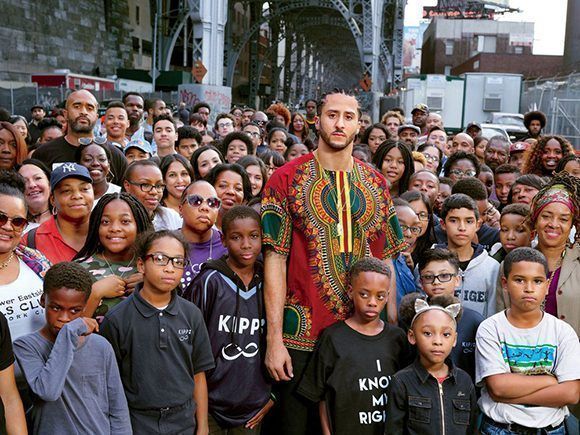
His fight for the rights of African Americans has cost him his career in the NFL, but Colin Kaepernick remains a symbol for activists. Photo: @ GQMagazine / Twiiter.
For a long time, Colin Kaepernick became a true symbol in the United States against the racial violence that the policemen inflict on black people, and that has led to murders.
The American football player’s stand cost him his career in the NFL, since he remains without a team and he himself denounces the fact that he is being made the victim of a “conspiracy” by the competition.
In spite of this, the icon does not abandon his struggle, and has obtained the recognition of being named “man of the year” by GQ magazine.
Kaepernick turned into an icon.
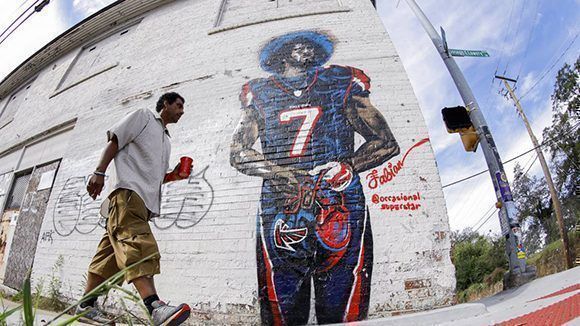
Kaepernick is a symbol in the United States. Photo: EFE
Kaepernick, turned into an icon
Attacked directly by Donald Trump, and seconded by almost all of his NFL teammates who popularized the gesture of kneeling while the US national anthem was played, Kaepernick is already almost a martyr of the racial struggle.
The ex-Quarterback of the San Francisco 49ers will express with words his fight in a book. And presumably that, his word, is the most valuable and complicated thing to obtain from him.
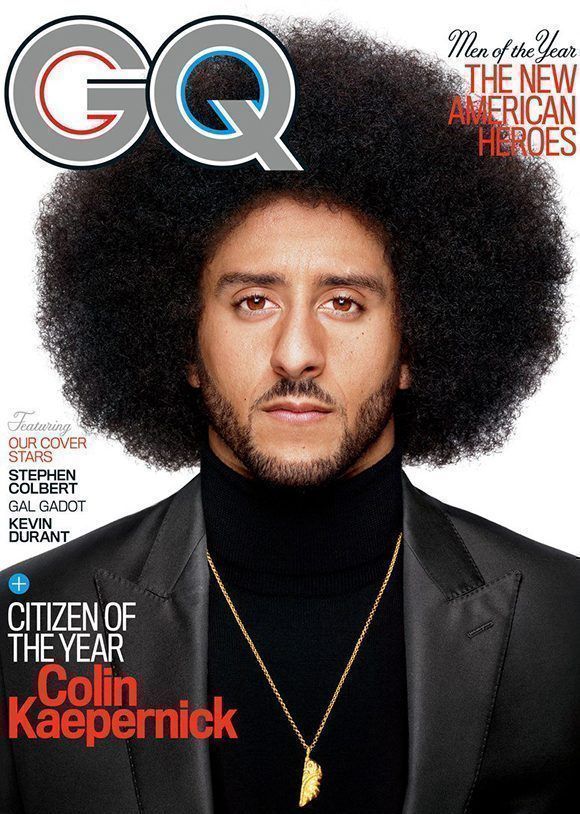
Colin Kaepernick, cover and “man of the year” according to GQ magazine. Photo: GQ.
Good proof is that he has even preferred not to give an interview to GQ for that report in which he is named “man of the year”, although at least he has had the deference of posing in various photos through the streets of Harlem, in New York.
The magazine announced that Kaepernick will be featured on its cover and will be honored as “man of the year”, highlighting his social and racial struggle and his already legendary gesture of August 27, 2016, when he refused to listen standing to the United States national anthem.
The real Cuban “threat” is about to start…
- English
- Español
The real cuban “threat” is about to start…
 by Nelson P. Valdés
by Nelson P. Valdés
February 22, 2016.
There are signs that Obama will be invited to speak over Cuban TV and radio when he visits Havana. (I urge him to go to Guantanamo and hand over the base to the Cubanos as it should have been done in 1934.)
Anyway, speaking over radio and TV, with the proper US provided translation should be a royal mindf*ck for the American ideologues and superficial analysts.
People don’t remember that when Ronald Reagan initiated Radio Marti the Cubans made an offer that Washington DC turned down. The Cubans offered a reciprocity regime by which Cuba would allow the Voice of America to broadcast from within the island and in return the Cubans would do the same with an English language program of Radio Habana Cuba broadcast to the American public within US territory.
Given the opportunity Obama will speak to the Cubanos. Of course, all the platitudes about about “democracy” and human rights will be mentioned. And, of course, the government in Havana will be as stable as ever, and all the foreign journalists and superficial writers will be puzzled.
Cubans are sufficiently sophisticated as to understand that such is the price that the US president has to pay to get away with attempting to improve relations with the island. Moreover, the Cuban population is more educated and politically savvy than most people realize. The very act will demonstrate that the historical confrontation was initiated by the United States and not by the Cuban government. But that is a long history to be dealt in another venue.
By the way, there are thousands of Cuban emigres and exiles returning to the island. The policy is fairly easy. Moreover, the returning Cubans can move back and forth between Cuba and the country where they had resided. Cubans can easily repatriate and also be allowed to purchase a dwelling and even start their own business. The legal problems are to be found abroad.
The question that Obama and others will have to address will be – what happens when the Cuban emigres want to retire in Cuba and expect to get their social security check in Cuba….! [Note: former Vietnamese exiles who established residence in the US eventually returned to Vietnam and they receive their social security checks in Saigon and elsewhere. Same with formed Chinese exiles and emigres.]
I will not be surprised if the US embassy in Havana already has to answer such queries. I get such questions here in ABQ.
Moreover, if the US “normalizes” relations with Cuba and permits the actual transfer of money payments I expect the following:
Americans will go in greater number to Cuba than to Mexico, Puerto Rico and the other islands of the Caribbean. Reasons? a) an educated population, b) absolutely NO VIOLENCE, c) NO DRUGS, d) sophisticated and lively culture. And – most important – the cost of living is cheaper.
In fact, a very different and existential Cuban threat is really about to begin. Or, as the head of the UNDP in Havana stated last April, Cubans have some material poverty and a lot of human capital and social wealth.
LA VERDADERA “AMENAZA” CUBANA ESTÁ A PUNTO DE COMENZAR….
 Por Nelson P. Valdés
Por Nelson P. Valdés
La traducción al español por CubaNews.
Hay indicios de que Obama será invitado a hablar en la TV y la radio cubanas cuando visite La Habana. [Lo exhorto a ir a Guantánamo y entregarle la base a los cubanos, como se debió hacer en 1934].
En fin, hablar por radio y televisión con la propia traducción ofrecida por Estados Unidos deberá ser una verdadera joded… para los ideólogos y analistas superficiales norteamericanos.
La gente no recuerda que cuando Ronald Reagan inició Radio Martí, Cuba hizo una propuesta que Washington, D.C. rechazó. Los cubanos ofrecieron un régimen de reciprocidad mediante el cual Cuba le permitiría a La Voz de las Américas transmitir desde la isla a cambio de que los cubanos harían lo mismo con un programa en idioma inglés transmitido por Radio Habana Cuba para el público estadounidense desde territorio de Estados Unidos.
Si le dan la oportunidad, Obama le hablará a los cubanos. Por supuesto, mencionará todas las trivialidades acerca de “democracia” y derechos humanos. Y por supuesto, el gobierno de La Habana seguirá tan estable como siempre, y todos los periodistas y escritores superficiales extranjeros se sentirán desconcertados.
Los cubanos son lo suficientemente sofisticados para comprender que ese es el precio que el presidente de Estados Unidos tiene que pagar para seguir intentando mejorar las relaciones con la isla. Además, el pueblo cubano es más educado y políticamente entendido que lo que piensa la mayoría de la gente. El propio acto demostrará que el enfrentamiento histórico fue iniciado por Estados Unidos y no por el gobierno cubano. Pero esa es una larga historia que se debe abordar en otro foro.
A propósito, miles de emigrados y exiliados cubanos están retornando a la isla. La política es bastante sencilla. Por otra parte, los cubanos que regresan pueden ir y venir de Cuba al país donde residían. A los cubanos se les puede repatriar con facilidad y también permitírsele comprar una vivienda e incluso abrir su propio negocio. Los problemas legales radican en el extranjero.
La cuestión que Obama y otros tendrán que abordar será: ¿Qué pasa cuando los emigrados cubanos quieren jubilarse en Cuba y esperan recibir su cheque de seguridad social en Cuba? [Nota: con el tiempo, los antiguos exiliados vietnamitas que establecieron residencia en Estados Unidos regresaron a Vietnam y reciben sus cheques de seguridad social en Saigón y otros lugares. Lo mismo sucede con antiguos exiliados y emigrados chinos.]
No me sorprendería que la embajada de Estados Unidos en La Habana ya esté respondiendo esas preguntas. A mí me las hacen aquí en ABQ.
De igual modo, si Estados Unidos “normaliza” relaciones con Cuba y permite la transferencia real de pagos monetarios, yo espero que pase lo siguiente:
Más estadounidenses irán a Cuba que a México, Puerto Rico y las otras islas del Caribe. ¿Las razones? a) un pueblo educado; b) NO HAY VIOLENCIA en lo absoluto; c) NO HAY DROGAS; d) cultura viva y desarrollada. Y algo más importante, el costo de la vida es más bajo.
De hecho, una amenaza cubana muy diferente y existencial está realmente a punto de comenzar. O como dijo el director del PNUD en abril pasado en La Habana, “Los cubanos tienen un poco de pobreza material y mucho capital humano y riqueza social”.
Jacob Perasso: “I Love Cuba”
- English
- Español

Jacob Perasso: I love Cuba
Yuniel Labacena Romero
digital@juventudrebelde.cu
January 13, 2016 20:39:18 CDT
A CubaNews translation. Edited by Walter Lippmann.
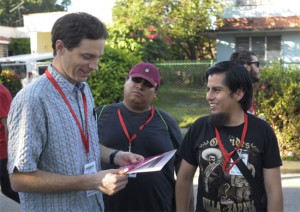
Jacob Perasso (left) during his last visit to Cuba Photo: Calixto N. Llanes
At only 20 years of age, Jacob Perasso witnessed how US policemen killed a worker very near to him. Since then he lead the struggle of young workers in his country and has strengthened his links with the largest island in the Antilles, whose reality he disseminates every minute.
The language barrier did not become an issue. He speaks almost perfect Spanish that might confuse those who hear him, with his very white skin, blue eyes and his portrait of the capitalist crisis. One may think that he was born in any country except where he lives, works, dreams, suffers the injustices of the system, and leads the struggle of young workers: the United States of America
I met Jacob Perasso while walking the corridors of the Conventions Palace in Havana, one of the venues of the 19th General Assembly of the World Federation of Democratic Youth (WFDY). We talked on the first day of the event and then we made an appointment to have this dialogue –which was finally done via email. The young man shared experiences and emotions arising from his links with Cuba.
A representative of the Socialist Youth and the Socialist Workers Party in his country, Jacob first came to Cuba in 1996. He was 20 years old. At that time he saw policemen in the US kill a worker very near to him. “The man had no weapons; 12 policemen beat him in the head to death and we had a demonstration in my neighborhood to bring them to jail.”
“I began my struggle against police brutality. Someone told me that in Cuba people are not treated like that. Shortly after, I was invited to participate in an exchange between youth organizations and I became very interested in knowing how everything was. So I found the socialist movement; I saw that a different world is possible and that there is a possibility of changing the values of human beings through a revolutionary struggle. Those were my reasons to start defending the Cuban Revolution,” said the young man, who today works as a clerk in the US railroad system.
He tells us that that first visit and the dozen he’s already made have contributed much to his political thinking. “The socialist revolution in Cuba is an example in the struggle against imperialism, because the people have withstood many years of attacks by the capitalist class of the country where I live. Your ability to fight and win is a sign of the awareness that people on this planet should have.
“Therefore, when I return to my country I report on that reality, the one that the mass media conceals. In addition, I continue the process of building an organization that is able to represent our interests and lead the struggle within the United States. Cuba’s example gives us the proof –along with the 1917 Bolshevik Revolution in Russia– that it is possible to reorganize society with a government that meets the needs of the working class.”
Believing in their innocence
Jacob was a constant participant in the struggle for the return of the Five. He says that he always believed they were innocent and more so when he investigated the case, knowing that Gerardo, Ramón, Antonio, Fernando and René “infiltrated terrorist organizations to prevent the danger not only to their nation but to my own also, and that is a lawful act for any patriot.”
He thus strengthened the struggle within the United States and organized activities where he spoke with workers, youth and other sectors about the truth of the case. Along with many of his colleagues, he went door-to-door in different neighborhoods, arranged art exhibitions with works of the Five in museums, universities and libraries, and organized open meetings with students so that more people got to know about the case. During this struggle he used the book The Cuban Five and The Militant newspaper, a weekly publication in which he disseminated information on the subject.
“Some of the attacks on the Five are commonly used against our working class in the fight against the system. We explained that the battle for freedom of the Five was also theirs. During their time in prison they won support from other prisoners who are part of the working class in the United States and this was a great motivation. Gradually more people were learning about the case and were willing to take the risks in this battle and are still denouncing injustices.”
The hardest part of the battle
It was explaining why the Five were fighting, why it was so important to defend them and why the working class of the United States should join in that fight. So when we learned of their return to Cuba, I was glad and so were my colleagues. I felt happy, and soon I thought more about the possibility of advancing our work in defense of the Revolution, because the resistance of its people –more than anything else– achieved this victory.
“During this time we have learned a lot from the Five; it’s not for nothing they are called heroes. Their behavior and disinterested support of good causes, not only of their country but also of the world, are evidence of the values that the Revolution has sown in all its children. I am quite sure that if we follow the example in Cuba and the United States, we will win all our battles.”
Recently Cuba and the United States restored diplomatic relations; what is your opinion about this?
“It’s a triumph. Washington had to change its policy, while Cuba did not give in one bit of its principles. However, we have to be alert because their goals have not changed; only the methods. The Democratic and Republican parties agree to create a movement against the Revolution and socialism from within. That is why they have not removed the cruel economic, financial and commercial blockade nor want to return the territory illegally occupied by the US naval base in Guantanamo.”
“We now reinforce these new causes for struggle –which are not new– and disclose the need to stand against these things. We conduct several actions in our country because we know that the US government continues to wage war against Cuba in all areas, though sometimes they try to show otherwise.”
Showing the Cuban reality
In his college years, Jacob never shared the values that he was being taught in favor of capitalism. Gradually he made up his mind in favor of worthy causes of the world and has strengthened his resolve in the struggles he leads in his workplace for the safety of his fellow workers.
“The railway is an industry in which the ruling class puts its employees and communities in great danger. In recent years we defeated an attempt by the owners to have only one person staffing each train; and today, even though there are still two, we keep up our struggle, because our rights are frequently violated.”
“Our government is the one who least defends the rights of our society; our country is the only one that has used the atomic bomb and who continues to ravage mankind with its killing machine. For them it would be better that we did not exist and that is unforgivable. There is no comparison with your Revolution which spreads love all over the world, supporting revolutionary movements and fighting for the rights of the oppressed. That’s why I love Cuba.”
“In Cuba, life is not easy, but the mentality of the human being is different. We do not have, for example, fundamental safeguards such as health, sports, education and culture, or doctors who want to go to Africa to fight Ebola, as you did. In my country, there is no solidarity among people and many times you do not have the chance to know these things. It is important that you preserve your history and let everyone know what the Cuban people have lived through.”
How do you manage to be a militant in a country where very few defend socialist ideas?
The United States is also a nation with history; we have a tradition of struggle. We face many difficulties when we want to explain the perspective of a socialist revolution. Luckily, at present we function as a legally established organization; and the support by many people is our greatest defense against the government. The difference between Cuba and the United States is that our country stands for the ruling class; the capitalists. Here you defend the workers: the people.
“In recent years the class struggle in the United States has deepened and millions of workers have begun to resist the effects of the capitalist economic downturn. Some begin to think more about the political rights we need to fight for, and see that capitalism has no future. In that context the interest in Cuba has grown as an example of a different alternative.”
“Most of the working class is interested in knowing what the Revolution is; and young Americans have the courage and the wish to help, to learn about everything, because for them, the largest of the Antilles is a reference point you have to look at in the middle of the crisis of capitalism. That is why our responsibility is to explain the reality of the Cuban revolution and defend its cause.”
“In this regard, for many years we have had good relations with the Union of Young Communists, and we work together on exchanges around the World Youth and Student Festivals. Young Cubans must meet the challenge of preserving socialism forever, to confront the pressure of the capitalist world, where the entire system –from education to the laws, courts and police– aim to isolate each individual and each family.”
Jacob is a young man who loves the arts, films, photography and jazz. Occasionally he is seen playing tennis and swimming –two sports that he likes a lot– as well as reading. Perhaps that is why he said he is eager to participate in the Cuban International Book Fair, since “it is a pleasure to experience that cultural event of the Revolution, where people have access to thousands of titles, to meet writers and intellectuals in order to enhance their knowledge.”
What do you admire most in our country? I ask the young man, and almost without letting me finish he responds: “Its conviction, serenity, deep trust in its leaders and in the revolutionary process. I love its people and their hospitality.”

Yo amo a Cuba
Con solo 20 años de edad, Jacob Perasso fue testigo de cómo la policía estadounidense mató a un trabajador muy cerca de él. Desde entonces guía la lucha de los jóvenes trabajadores de ese país y estrechó sus vínculos con la Mayor de las Antillas, cuya realidad ha divulgado cada minuto
Yuniel Labacena Romero
digital@juventudrebelde.cu
13 de Enero del 2016 20:39:18 CDT

Jacob Perasso (izquierda) durante su última visita a Cuba. Foto: Calixto N. Llanes
La barrera del idioma no se tornó complicada. Habla un español casi perfecto que pudiera confundir a quienes lo escuchan, y lo ven con su piel blanquísima, sus ojos claros y su retrato de la crisis capitalista. Podemos pensar que nació en cualquier país menos en el que vive, trabaja, sueña, sufre las injusticias del sistema y donde guía la lucha de los jóvenes trabajadores: Estados Unidos.
A Jacob Perasso lo conocí mientras recorría los pasillos del Palacio de Convenciones de La Habana, una de la sedes de la XIX Asamblea General de la Federación Mundial de Juventudes Democráticas (FMJD). Conversamos el primer día del evento y después nos dimos cita para este diálogo —que terminó vía correo electrónico—, en el que el joven compartió vivencias y emociones de sus vínculos con Cuba.
Representante de la Juventud Socialista y del Partido Socialista de los Trabajadores de su país, Jacob llegó por vez primera a la Mayor de las Antillas en 1996. Tenía 20 años de edad. En ese entonces vio cómo en Estados Unidos la policía mató a un trabajador muy cerca de él. «Aquel hombre no tenía armas; 12 policías lo golpearon en la cabeza hasta asesinarlo e hicimos una manifestación en mi barrio para encarcelarlos.
«Comencé mi lucha contra la brutalidad policiaca. Alguien me comentó que en Cuba no tratan a las personas así. Poco después me invitaron a participar en un intercambio de organizaciones juveniles y me interesé mucho por saber cómo es todo. Así encontré al movimiento socialista; vi que un mundo diferente es posible y que existe la posibilidad de cambiar los valores del ser humano con una lucha revolucionaria. Fueron esas las motivaciones para empezar a defender la Revolución Cubana», dijo el joven, quien hoy labora como empleado en el ferrocarril estadounidense.
Cuenta que esa primera visita y la decena que ya ha realizado han contribuido mucho a su pensamiento político. «La Revolución socialista en Cuba es ejemplo en la pelea contra el imperialismo, pues el pueblo ha resistido muchos años de ataques de la clase capitalista de donde vivo. Su capacidad de luchar y vencer es muestra de la conciencia que deben tener los habitantes en este planeta.
«Por eso, al regresar a mi país divulgo la realidad, esa que ocultan los grandes medios de comunicación. Además, sigo el proceso para edificar una organización que sea capaz de representar nuestros intereses y dirigir la lucha dentro de Estados Unidos. El ejemplo de Cuba nos da la prueba, junto con la Revolución bolchevique de 1917, en Rusia, de que es posible reorganizar la sociedad con un Gobierno que responda a las necesidades de la clase trabajadora».
Creer en la inociencia
Jacob fue parte indisoluble en la lucha por el regreso de los Cinco. Según cuenta siempre creyó en su inocencia y más cuando investigó el caso, al saber que Gerardo, Ramón, Antonio, Fernando y René «infiltraron organizaciones terroristas para prevenir del peligro no solo a su nación sino a la mía también, y ese es un acto lícito para cualquier patriota».
Así fortaleció la batalla dentro de Estados Unidos y desarrolló actividades donde hablaba con los trabajadores, jóvenes y otros sectores sobre la verdad del caso. Junto a muchos de sus colegas fue de puerta en puerta a diferentes barrios, realizó muestras del arte de los Cinco en museos, universidades y bibliotecas, y organizó reuniones abiertas de estudiantes con el propósito de que más gente conociera del caso. Durante esta lucha se valió del libro Los Cinco Cubanos y del periódico The Militant, una publicación semanal en la cual divulgaba información sobre el tema.
«Algunos de los ataques a los Cinco son comúnmente empleados contra nuestra clase trabajadora que lucha contra el sistema. Nosotros explicamos que la batalla por la libertad de los Cinco era también de ellos. Durante su tiempo en la cárcel ganaron apoyo de otros presos que son parte de la clase trabajadora de Estados Unidos y ello motivó mucho. Poco a poco más gente fue aprendiendo del caso y estuvo dispuesta a correr los riesgos de esta batalla y todavía siguen denunciando las injusticias».
—¿Lo más difícil de la batalla?
—Explicar por qué ellos estaban luchando, por qué era tan importante defenderlos y por qué la clase trabajadora de Estados Unidos debía unirse en esa lucha. Por eso cuando supimos de su regreso a Cuba no solo yo me alegré sino también mis colegas. Me sentí feliz, y poco después pensé más en la posibilidad de avanzar en nuestra labor en defensa de la Revolución, pues la resistencia de su pueblo ganó esta victoria más que todas las otras cosas.
«Durante este tiempo hemos aprendido mucho de los Cinco, que no por gusto llamamos héroes. Su comportamiento y desinterés ante el respaldo de las buenas causas no solo de su país sino también del mundo son muestras de los valores que ha formado la Revolución en todos sus hijos. Estoy muy seguro de que si seguimos el ejemplo en Cuba y en Estados Unidos, venceremos en todas nuestras batallas».
—En fecha reciente Cuba y Estados Unidos restablecieron sus relaciones diplomáticas, ¿qué opinión tienes sobre esto?
—Es un triunfo. Washington tuvo que cambiar su política, mientras Cuba no cedió en sus principios ni un ápice. Sin embargo tenemos que estar alertas, ya que sus objetivos no han cambiado, solo los métodos. Los partidos Demócrata y Republicano están de acuerdo en crear un movimiento contra la Revolución y el socialismo desde adentro, por eso no han quitado el cruel bloqueo económico, financiero y comercial ni quieren devolver el territorio ilegalmente ocupado por la base naval en Guantánamo.
«Nosotros reforzamos ahora estas nuevas causas de batalla —que no son nuevas—, y divulgamos la necesidad de estar en contra de estas cosas. Desarrollamos diversas acciones en nuestro país, pues sabemos que la guerra del Gobierno estadounidense sigue contra Cuba en todos los espacios, aunque a veces muestren lo contrario».
Enseñar la realidad cubana
En sus años de estudiante universitario, Jacob nunca compartió los valores que le pretendían enseñar a favor del capitalismo. Poco a poco fue formando su pensamiento a favor de las causas nobles del mundo, este se ha fortalecido en las luchas que desarrolla en su centro de trabajo por la seguridad de sus compañeros.
«El ferrocarril es una industria en la cual la clase dominante pone a sus empleados y comunidades en mucho peligro. En años recientes derrotamos un intento de los patrones de tener solo una persona manejando cada tren, y aunque hoy existen dos, mantenemos nuestra lucha, pues se violan mucho nuestros derechos.
«Nuestro Gobierno es el que menos defiende los derechos de su sociedad; nuestro país es el único que ha usado la bomba atómica y que sigue con su maquinaria acabando con la humanidad, para ellos es mejor que no estemos y eso no tiene perdón con nada. No existe comparación con la Revolución de ustedes que va por el mundo repartiendo amor, apoyando los movimientos revolucionarios y luchando por los derechos de los oprimidos. Por eso yo amo a Cuba.
«En Cuba no es fácil la vida, pero la mentalidad del ser humano es diferente. Nosotros no tenemos, por ejemplo, garantías fundamentales como la salud, el deporte, la educación y la cultura, o doctores que quieran ir a África a combatir el ébola como lo hicieron ustedes. En mi país no se vive la solidaridad entre la gente y muchas veces ustedes no tienen la posibilidad de conocer esas cosas; es importante que preserven su historia y conozcan todo lo que ha vivido el pueblo cubano».
—¿Cómo es posible militar en un país donde muy pocos defienden las ideas socialistas?
—Estados Unidos también es una nación de historia, tenemos tradición de lucha. Enfrentamos muchas dificultades cuando queremos explicar la perspectiva de una revolución socialista. Por suerte, durante este tiempo funcionamos como organización de forma legal y el respaldo de numerosas personas es nuestra mayor defensa contra el Gobierno. La diferencia entre Cuba y Estados Unidos es que en nuestro país se defiende la clase dominante, la capitalista, y ustedes a los trabajadores, al pueblo.
«En los últimos años la lucha de clases en Estados Unidos se ha profundizado, y millones de trabajadores han empezado a resistir los efectos de la caída económica capitalista. Algunos empiezan a pensar más en los derechos políticos que necesitamos para combatir, y piensan que el capitalismo no tiene futuro. En ese contexto se ha incrementado el interés por Cuba, ejemplo de una alternativa diferente.
«La mayoría de la clase trabajadora se interesa por saber qué es la Revolución y los jóvenes norteamericanos tienen ánimo y ganas de ayudar, de aprender sobre todo, porque para ellos la Mayor de las Antillas es un referente a donde hay que mirar en medio de la crisis del capitalismo. Por eso es nuestra la responsabilidad de explicar la realidad de la Revolución Cubana y la defensa de su causa.
«En tal sentido, desde hace muchos años tenemos buenas relaciones con la Unión de Jóvenes Comunistas y trabajamos juntos en intercambios en torno a los festivales mundiales de la juventud y los estudiantes. Los jóvenes cubanos tienen el desafío de preservar por siempre el socialismo, enfrentando la presión del mundo capitalista, donde todo el sistema, desde la educación hasta las leyes, cortes y policía, tiene el propósito de aislar a cada persona y cada familia».
Jacob es un joven al que le gustan las artes plásticas, el cine, la fotografía y el jazz. De vez en cuando se le ve jugando tenis y en la natación, pues son dos deportes que le agradan mucho, como también la lectura. Quizá por ello aseguró que tiene muchas ganas de participar en la Feria Internacional del Libro cubana, ya que «es un placer ver ese evento cultural de la Revolución, en el que la gente tiene acceso a miles de títulos, encuentros con escritores e intelectuales, con el fin de contribuir a su formación».
¿Qué más admiras de nuestro pueblo?, pregunto al joven, y casi sin darme tiempo para terminar responde: «Su convicción, serenidad, profunda confianza en sus líderes y en el proceso revolucionario, su gente y la hospitalidad».
Subscribe to Blog via Email
| M | T | W | T | F | S | S |
|---|---|---|---|---|---|---|
| 1 | 2 | 3 | 4 | 5 | 6 | 7 |
| 8 | 9 | 10 | 11 | 12 | 13 | 14 |
| 15 | 16 | 17 | 18 | 19 | 20 | 21 |
| 22 | 23 | 24 | 25 | 26 | 27 | 28 |
| 29 | 30 | |||||

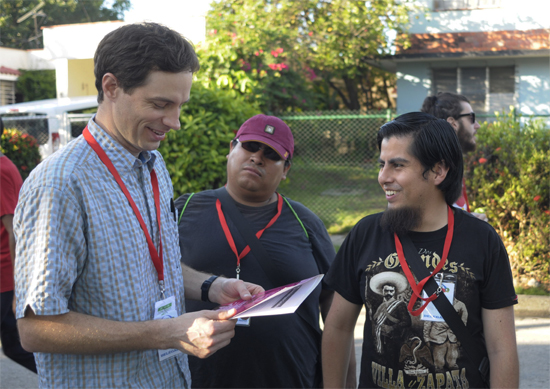
You must be logged in to post a comment.